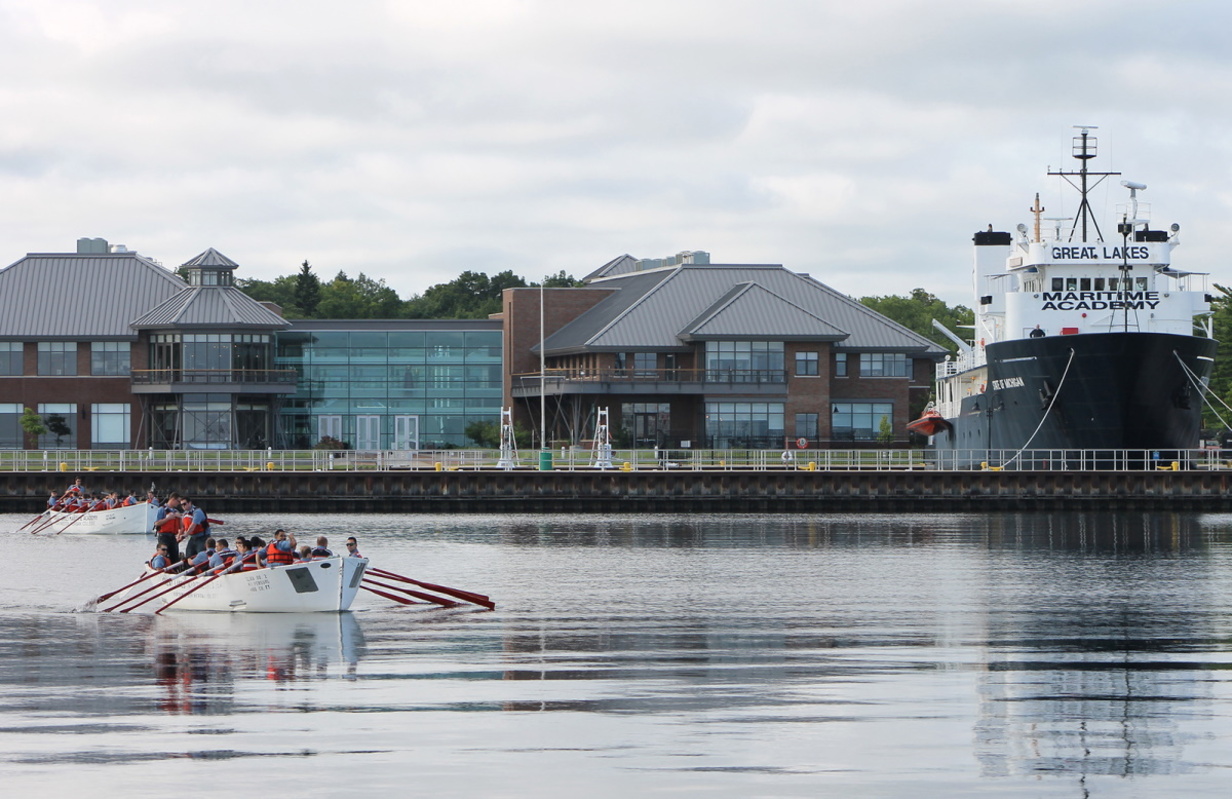
NMC Eyes Potential Nine-Figure Fundraising Campaign
By Craig Manning | May 3, 2025
Dollars and cents were the overarching themes of this month’s meeting of the Northwestern Michigan College (NMC) Board of Trustees. In addition to adopting rate increases for campus housing and meal plans, the board approved a $60,000 feasibility study for a potentially massive fundraising campaign, authorized a $1.24 million design contract for an ambitious geothermal energy project, and heard updates from NMC President Nick Nissley about how federal executive orders are affecting college funding.
Fundraising campaign
Speaking with The Ticker last summer, Nissley noted that NMC’s widescreen vision for the next 5-10 years – which includes things like replacing student housing and building the Traverse City Freshwater Research & Innovation Center (FRIC) – would carry a significant price tag, thus demanding the college’s biggest capital campaign ever. NMC’s last fundraising effort, the Be What’s Possible Campaign, wrapped in 2021 with a final tally of $40.2 million. Nissley estimated last summer that the next campaign “will likely need to be about double” the size.
Now, NMC is taking preliminary steps to launch that record-breaking campaign. At a meeting this past Monday, college trustees voted to enter into a $60,000 contract with The Winkler Group, a Farmington Hills-based consulting firm with expertise in capital campaigns, for a “campaign feasibility study.”
The feasibility study is intended to “test the internal and external readiness for a proposed $50M-$75M Comprehensive Campaign with a stretch goal of $100M over seven to no more than eight years (FY25 - FY32),” noted a memo from Dino Hernandez, NMC’s chief advancement officer (CAO). Hernandez wrote that the timing of the campaign was planned to align with both the creation of a new three-year strategic plan – something NMC will undertake during the 2025-26 academic year – as well as the college’s 75 anniversary, which will occur in 2026.
“The scope of work for the campaign feasibility study entails a Phase I, which would craft the feasibility study itself; identify the major donors and key volunteers to interview; and determine the correct messaging,” Herandez wrote. The $60,000 will pay for that first phase, which will run from May 1 to the end of August. If necessary, NMC could engage The Winkler Group for ongoing consulting services, but additional phases and expenditures would require separate authorization from the board.
NMC worked with a different contractor, Westwind Consulting, for a 2015 feasibility study ahead of the Be What’s Possible campaign. That study cost the college $77,301, “with additional consulting services totalling $177,301 over two years.”
“The anticipated cost for this request will be far less than what was spent in 2015,” Hernandez wrote in his memo, citing both NMC’s experience from the Be What’s Possible campaign and his own 30-year career in higher education fundraising as reasons that additional consulting phases will likely not be needed this time around. “Based on a conservative estimate of a $75M goal, NMC and the NMC Foundation would only be spending less than one penny for every dollar raised based on a $60,000 expenditure.”
Nissley told The Ticker last year that Hernandez had been chosen to lead NMC’s fundraising in part because of his previous successes at Lawrence Technological University, where he spearheaded a campaign “which had a goal of $75 million but ended up raising $110 million.”
At Monday’s meeting, Nissley also praised the work Hernandez has already done with the NMC Foundation since coming aboard as NMC’s first-ever CAO last August.
“There was a goal this past year, of $2.4 million being raised by the foundation,” Nissley said. “Dino broke that not even halfway through the year. He came back with a stretch goal, broke that within two months. And we’re now up over $4.1 million [in funds raised this year].”
Executive orders
NMC’s push to raise more capital comes amidst federal executive orders that Nissley said have posed significant challenges for the college this year.
“We are seeing funding being pulled back from the Dennos because of specific executive orders that have targeted grants that are related to museums and libraries,” Nissley said. “We also, just this weekend, found out that AmeriCorps is essentially being 100 percent defunded. We have funding for our [student success] coaches that comes through AmeriCorps. It’s likely, by the end of May, we will not be able to pay those coaches anymore, because of that lack of funding. And while FRIC isn’t being directly impacted, we do know that things like the Great Lakes Observation System, as well as Lakebed 2030, have all been threatened, and we are likely to see that funding dry up at a time when we’re trying to fill tenants based on research dollars that are going away...”
Nissley praised Jason Slade, NMC’s vice president for strategic initiatives, for “trying to build some of the federal and state support back.” Slade’s efforts include a trio of pending $3 million congressionally-directed spending requests – one each through U.S. Representative Jack Bergman and U.S. Senators Gary Peters and Elissa Slotkin – as well as a pair of $1 million Michigan budgetary earmark proposals through State Senator John Damoose and State Rep Betsy Coffia.
Nissley did point to one Trump executive order that could help NMC: the “Restoring America’s Maritime Dominance Act,” which the president announced on April 9.
“The idea behind the executive order is to increase shipbuilding and shipping back into the U.S. It does specifically put dollars to it, to the tune of $1 billion,” Nissley told the board. “Within the executive order was specific language that spoke to the maritime workforce – that if we want to grow those industries, obviously, we’ve got to build the workforce.”
The executive order provided a 90-day window for key maritime agencies to report to the Secretary of Transportation about specific industry needs. One agency required to make a report is the U.S. Maritime Administration (MARAD), which administers funding support to the six state maritime academies, including NMC’s Great Lakes Maritime Academy (GLMA).
“[MARAD] reached out to us and all the other state maritime academies and asked us to put together some plans – and we have plans, literally, about how we could potentially double the size of GLMA,” Nissley said. “Our hope is that they look at it seriously.”
Other meeting news:
>NMC trustees approved rate hikes for student housing and meal plans for the 2026 fiscal year. According to meeting documents, those changes will cost the majority of students who use those services an extra $100 per semester for campus housing and an extra $50 to $100 per semester for meal plans.
>The board authorized NMC administration “to enter into a single prime contract with The Christman Company in the amount of $1,240,540 for technical audit and design services for the proposed geothermal exchange system.” That contract is funded in part by a Department of Energy grant. NMC’s Timothy J. Nelson Innovation Center has been powered by geothermal energy since it opened, but the college wants to power five other campus buildings with geothermal, too.
>Trustees also authorized the Dennos Museum to apply for a Michigan Arts & Culture Council grant. Per a letter to the board from Dennos Executive Director Craig Hadley, the grant program has an award ceiling of $45,000 and has previously helped support “exhibition, programming, and concert-related expenses at the Dennos Museum Center for many years.”
Comment






